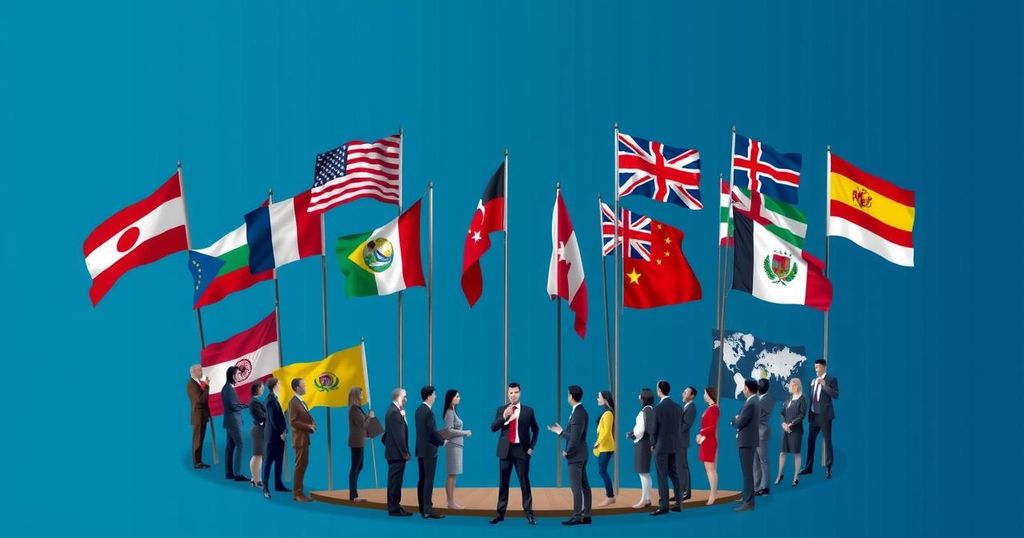The article examines the implications of the US possibly withdrawing from COP climate talks under President-elect Trump, contrasting this with China’s emerging leadership role. China’s unprecedented commitment of over $24 billion for climate action indicates a shift in its negotiation style, highlighting its dominant position in renewable energy technologies. This could lead to significant changes in climate negotiations and impact the global effort to combat climate change.
The recent COP climate gathering showcased a significant shift in the global dialogue on climate change, particularly in light of the United States’ potential withdrawal from the COP process under President-elect Donald Trump. While many negotiators expressed frustration at the stagnation of negotiations, the chief negotiator from a major country noted that China was demonstrating an unusually cooperative approach. Historically, China has oscillated between alignment and obstruction in climate negotiations. However, this year’s conference highlighted an increased willingness from China to take on a leadership role, particularly evident in its commitment of over $24 billion for climate action in developing nations since 2016.
The dynamics of these talks are further complicated by China’s designation as a developing country, a status sustained despite its status as the world’s second-largest economy. This classification absolves China from monetary contributions to established climate funds, which currently total $100 billion annually, far short of the $1 trillion needed by developing countries for a sustainable energy transition. Agreements on this funding remain a contentious issue, but China’s investments in renewable technologies have positioned it advantageously in the global market.
China’s significant footing in renewable energy, including its dominance in solar panels, wind turbines, and electric vehicles, indicates a drive toward not only innovation but also economic opportunity. The demand for clean energy solutions in developing regions is surging, aligning with China’s Belt and Road Initiative, which seeks to enhance global trade routes and facilitate economic partnerships.
The possibility of China adopting a more central role in climate talks represents a fundamental transformation in the COP process, with potential repercussions for how negotiations unfold. Historically, Western nations have led these initiatives, but experts suggest that China’s involvement may manifest in more discreet mechanisms of influence rather than overt leadership.
Despite past alignments with fossil fuel interests, the prevailing view is that future climate discussions will be shaped more by economic realities and the urgency of energy transition than by geopolitical tensions. This paradigm shift reflects the growing recognition that engagement in these conversations could unlock vast opportunities in emerging markets.
In conclusion, as the United States contemplates stepping back from climate dialogue, China’s proactive engagement signals a potential redesign of the international climate cooperation framework. This new dynamic may pave the way for significant advancements in global climate policy, underpinned by economic interests and technological progress.
The article focuses on the implications of the United States’ possible withdrawal from the COP climate negotiations under the leadership of President-elect Donald Trump, who has historically dismissed climate action. It contrasts this with a notable shift in China’s engagement at COP, highlighting its increased cooperation and substantial financial commitments. Furthermore, the article delves into China’s unique position as both a developing country and a technology leader in renewable energy, placing it at the forefront of future climate negotiations. This evolving landscape reflects broader changes in international politics and economic priorities surrounding climate action.
The anticipation of the United States potentially exiting the COP process could catalyze a shift in leadership towards China, as indicated by its increasing involvement and cooperative stance in climate negotiations. This scenario may enable China to expand its influence in global climate action while simultaneously addressing the demand for renewable energy solutions in developing countries. The transformation of climate dialogue, driven by economic factors and evolving geopolitical relationships, may ultimately reframe the future trajectory of international climate policy, emphasizing collaboration amid the changing climate landscape.
Original Source: www.bbc.co.uk






